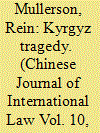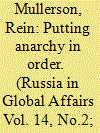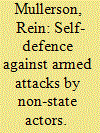|
|
|
Sort Order |
|
|
|
Items / Page
|
|
|
|
|
|
|
| Srl | Item |
| 1 |
ID:
107082


|
|
|
|
|
| Publication |
2011.
|
| Summary/Abstract |
In June 2010, a bloody conflict took place in southern Kyrgyzstan. In inter-ethnic clashes, more than 470 people were killed, and more than 110 000 became refugees. The Independent International Commission, of which the author was one of seven members, found that certain attacks against Uzbeks might constitute crimes against humanity. The article analyses the political context of the crisis, the role of ethno-nationalism in its genesis as well as difficulties and challenges the Government and people of Kyrgyzstan face in building an inclusive society where all ethnicities feel at home. The article scrutinizes the June events and following developments in the light of international, including human rights, law. Comparative analysis allows a singling-out of what in the Kyrgyz crisis may be specific for this country and what lessons other societies may learn to avoid similar conflicts.
|
|
|
|
|
|
|
|
|
|
|
|
|
|
|
|
| 2 |
ID:
097078


|
|
|
|
|
| Publication |
2010.
|
| Summary/Abstract |
In the process of proliferation from Africa, communities of Homo sapiens became more and more different in terms of the colour of their eyes and skin, the languages they spoke, the songs they sang, the animals they hunted or domesticated; now a reverse process seems to be slowly taking place. Of course, many differences remain and there is a strongly positive side to that. However, today in the emerging global megapolis, a painful process of assimilation is replacing the earlier process of dissimilation. The East and the West will probably meet somewhere in the middle ground; both not merely bringing their respective values to the evolving global normative synthesis, these values are being modified in this process. Neither exclusively "Eastern authoritarian collectivistic" nor "Western liberal individualistic" responses are adequate when facing contemporary challenges. In a sense, humankind may indeed be in the process of completing a full cycle: from a single community through the proliferation and diversification of communities towards the emergence of a community of communities that should become, in some important respects, more and more similar to each other, i.e., a slow and contradictory process of assimilation is replacing the millenia-long process of dissimilation.
|
|
|
|
|
|
|
|
|
|
|
|
|
|
|
|
| 3 |
ID:
146261


|
|
|
|
|
| Summary/Abstract |
Every political system, and the international system is not an exception, faces the problem of power. Without effective power there is anarchy and chaos while concentration of power suppresses individual as well as collective liberties. Within societies organized as states, i.e. relatively hierarchical societies, one of the most effective remedies against excessive concentration of power is the principle of separation of powers into legislative, executive and judicial branches and their balance. International society (or system) is a horizontal or relatively anarchical system where power is much more dispersed in comparison with societies organized as states.
|
|
|
|
|
|
|
|
|
|
|
|
|
|
|
|
| 4 |
ID:
171255


|
|
|
|
|
| Summary/Abstract |
Armed attacks in the sense of Article 51 and customary international law can be carried out not only by States, but also by non-State actors (NSA). Self-defensive responses to attacks by NSAs, due to their specific characteristics, may contain a combination of elements of anticipatory self-defence and defensive reprisals. If a State, from the territory of which an attack originates, is unable to prevent an NSA attacking a third State, it has to ask for and to accept the assistance of the victim State, other States, or relevant international organisations. The latter cannot use military force in self-defence in such circumstances without having first sought the consent of the territorial State. However, if a State is unwilling to prevent an NSA, operating from its territory, from attacking third States, it becomes an accessory-after-the-fact to armed attacks of the NSA. Self-defensive, either individual or collective, measures can be carried out on the territory of such a State even without its consent.
|
|
|
|
|
|
|
|
|
|
|
|
|
|
|
|
| 5 |
ID:
134208


|
|
|
|
|
| Publication |
2014.
|
| Summary/Abstract |
The end of the Cold War should also have meant the coming of the flourishing of international law, many (myself included) naively believed. However, the "uni-polar moment" that gained momentum in the 1990s, though its life-span turned out to be rather short, saw a gung ho attitude towards foundational principles of international law such as non-use of force and non-interference in internal affairs of states. NATO's 1999 operation over Kosovo, the 2003 invasion of Iraq, the 2008 Georgia-Russia war, policies reflected in the slogan "all the options are on the table", and now Ukraine's tragedy show that international law and morality are used mainly as covers in the geopolitical struggle. If the Cold War manifested the competition between two ideologies-capitalism and communism-today's main historical controversy is between the uni-polar and multi-polar visions of the world. It is not ideological, it is geopolitical, where ideology, morality and law are used as tools and collaterals in the struggle for the configuration of tomorrow's world. It is also a struggle for the nature of international law. Will it become a kind of supra-national law (à la EU law for the whole world) dictated from one centre, or will it develop as a legal system based on the balance of interests and values of different states and cultures? The author believes that the world is simply too big, complex and diverse for the first choice to realize in practice. Its rich tapestry cannot be flattened into a carpet where one pattern, be it of a Judeo-Christian, Anglo-Saxon, Confucian, Muslim or even secular liberal-democratic pattern, prevails. Attempts to force one, "the only true", vision on the whole world not only undermine international law; they are also utopian endeavours fraught with endless conflicts.
|
|
|
|
|
|
|
|
|
|
|
|
|
|
|
|
|
|
|
|
|